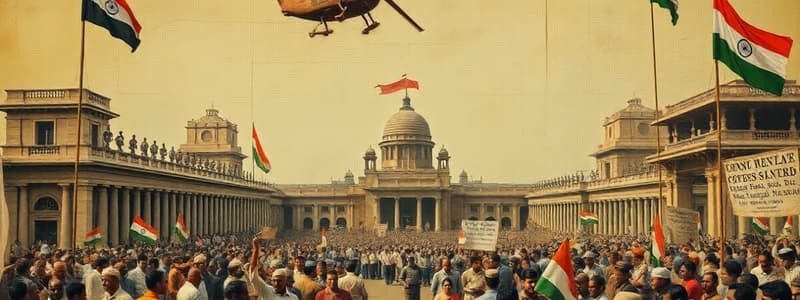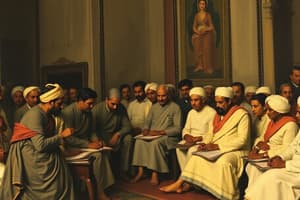Podcast
Questions and Answers
What were the primary areas of focus during the early sessions of the Congress?
What were the primary areas of focus during the early sessions of the Congress?
- Cultural reforms and educational policies
- Health care improvements and sanitation
- Military strategies and foreign diplomacy
- Administrative reforms and economic policies (correct)
What was a significant limitation of the early Indian National Congress?
What was a significant limitation of the early Indian National Congress?
- Broad representation from all social classes
- Focus solely on radical change
- Aggressive militancy in approach
- Predominantly upper-class leadership (correct)
Which issue was NOT a significant concern for the early Congress?
Which issue was NOT a significant concern for the early Congress?
- Economic exploitation of India
- Adequate representation in government
- Development of military capabilities (correct)
- Protection of Indian industries
The early Congress adopted a primarily moderate approach. What was a consequence of this strategy?
The early Congress adopted a primarily moderate approach. What was a consequence of this strategy?
What contributed to the shift in perspectives within the Indian National Congress?
What contributed to the shift in perspectives within the Indian National Congress?
What contributed to the growing disaffection towards British policies in India during the late 19th century?
What contributed to the growing disaffection towards British policies in India during the late 19th century?
Who was primarily responsible for founding the Indian National Congress in 1885?
Who was primarily responsible for founding the Indian National Congress in 1885?
What was one of the initial objectives of the Indian National Congress?
What was one of the initial objectives of the Indian National Congress?
Which of the following best describes the early activities of the Indian National Congress?
Which of the following best describes the early activities of the Indian National Congress?
What was a characteristic of the early leaders of the Indian National Congress?
What was a characteristic of the early leaders of the Indian National Congress?
In what manner did the Indian National Congress initially function?
In what manner did the Indian National Congress initially function?
Which of the following leaders was NOT among the early prominent figures of the Indian National Congress?
Which of the following leaders was NOT among the early prominent figures of the Indian National Congress?
How did the Indian National Congress contribute to the representation of Indian interests?
How did the Indian National Congress contribute to the representation of Indian interests?
Flashcards
Indian National Congress (INC) Formation
Indian National Congress (INC) Formation
The INC was formed in 1885 by A.O. Hume, a British civil servant, to provide a platform for educated Indians to present their grievances to the British government.
Early INC Objectives
Early INC Objectives
The initial goals of the INC were to gain more Indian representation in the administration, improve local self-governance, safeguard Indian interests in the legislature/administration, and address socioeconomic issues.
Early INC Leaders
Early INC Leaders
Important figures like Dadabhai Naoroji, Surendranath Banerjee, Gopal Krishna Gokhale, and Pherozeshah Mehta were prominent in the early Congress.
Early INC Methods
Early INC Methods
Signup and view all the flashcards
Indian Discontent
Indian Discontent
Signup and view all the flashcards
INC's Approach
INC's Approach
Signup and view all the flashcards
British Influence
British Influence
Signup and view all the flashcards
Initial Congress Members
Initial Congress Members
Signup and view all the flashcards
Early Congress Focus
Early Congress Focus
Signup and view all the flashcards
Indian Concerns
Indian Concerns
Signup and view all the flashcards
Limited Participation
Limited Participation
Signup and view all the flashcards
Moderate Approach
Moderate Approach
Signup and view all the flashcards
Shifting Perspectives
Shifting Perspectives
Signup and view all the flashcards
Study Notes
Early Influences and Context
- The Indian National Congress (INC) emerged from a confluence of factors, including the growing disaffection towards British policies in India.
- The late 19th century saw increasing awareness of nationalist sentiment among educated Indians, many of whom were inspired by contemporary political movements in other parts of the world.
- The socioeconomic conditions in British India, marked by economic exploitation and limited opportunities for Indians in government positions, further fueled the desire for self-governance.
- The British administration's perceived insensitivity to Indian concerns, and their policies that seemed to favor British interests above Indian ones, contributed to the rising resentment.
Formation and Initial Objectives
- The founding of the Indian National Congress in 1885 was primarily spearheaded by A.O. Hume, a British civil servant. Hume's intention was to provide a platform for educated Indians to voice their grievances and present their views to the British government.
- The initial objectives of the Congress were largely moderate and focused on securing greater Indian participation in the administration and addressing issues of public interest like the expansion of local self-governance, the protection of Indian interests in legislative and administrative bodies, and alleviation of socioeconomic pressures.
- The early leaders of the Congress, largely drawn from the upper strata of Indian society (landlords, industrialists, lawyers, and journalists) were primarily concerned with the reform of the existing system rather than its complete overthrow.
- The Congress functioned mainly as a pressure group, employing constitutional means to raise the grievances of Indians.
Early Leadership and Activities
- Early Congress leaders included prominent figures such as Dadabhai Naoroji, Surendranath Banerjee, Gopal Krishna Gokhale, and Pherozeshah Mehta, each contributing distinctive approaches to the early movement.
- Their methods mostly included petitions, meetings, and discussions with British officials, aiming for a dialogue and eventual policy adjustments that prioritized Indian interests.
- The Congress increasingly showcased Indian unity across diverse regions and communities, though initial representation varied across different segments.
- The focus remained largely on the representation of Indian interests at the legislative, bureaucratic, and administrative levels within the established system.
Key Issues Addressed
- Early Congress sessions predominantly centered on administrative reforms, economic policies, the Indian Civil Service (ICS), and legislative representation.
- Issues of Indian economic exploitation, perceived unjust taxation policies, and the lack of adequate protection for Indian industries were at the forefront of these concerns.
- The political representation of Indians in the government, and the associated bureaucratic and legislative participation, emerged as critical areas of advocacy.
- The Congress meticulously documented the perceived shortcomings of British administration, highlighting issues pertaining to public works, education, and economic development. The issues were presented in carefully researched memoranda and reports, which became part of the Congress's growing archival material.
Limitations of the Early Phase
- Despite the importance of its role in laying the groundwork for future independence movements, the initial phase of the Congress was not without limitations.
- The predominantly upper-class nature of its leadership and members limited the participation potential of broader segments of Indian society.
- The largely constitutional approach and focus on reform, rather than radical change, left some activists with unanswered or unmet aspirations.
- The lack of wide popular participation restricted the Congress's impact on the vast Indian population.
Shifting Perspectives and The Path Forward
- While the early Congress primarily focused on moderate demands through constitutional strategies, the growing disillusionment with the pace of reforms and the continued neglect of Indian interests contributed to a gradual shift in perspectives within the movement.
- This evolution toward more assertive and radical approaches would define subsequent phases of the Indian freedom struggle.
Studying That Suits You
Use AI to generate personalized quizzes and flashcards to suit your learning preferences.




